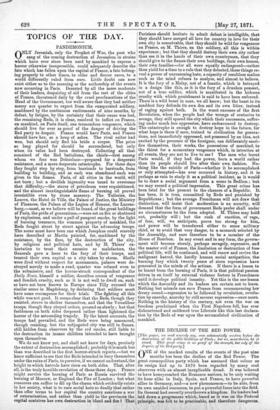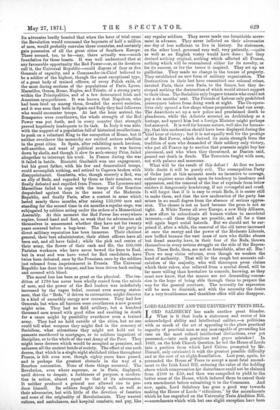THE DECLINE OF THE RED POWER.
[This paper, we need scarcely say, was substantially written before the destruction of the public buildings of Paris; but we, nevertheless, let it stand. That great crime is no proof of the strength, but only of the- despair, of the Red party.] ONE of the marked results of the events of the past nine months has been the decline of the Red Power. The great cosmopolitan party which has assumed that colour as its ensign had up to 1870 been regarded by many cool. observers with an almost inexplicable dread. It was believed to have honeycombed the Romance nations, to be only waiting its hour alike in Italy, Spain, and France, to have powerful allies in Germany, and—a new phenomenon—to be able, from its own unaided resources, to put a powerful force into the field. Its General had recently overthrown a kingdom. Its leaders had laid down a programme which, based as it was on the Federal principle, was felt to be practicable, and therefore dangerous. Its advocates loudly boasted that when the hour of trial came the Revolution would command the bayonets of half a million of men, would probably convulse three countries, and certainly gain possession of all the great cities of Southern Europe. There seemed, too, to be—nay, there actually was—much foundation for these boasts. It was well understood that at any favourable opportunity the Red Power—or, as its devotees call it, the Universal Republic—could dispose of four or five Generals of capacity, and a Commander-in-Chief believed to be a soldier of the highest, though the most exceptional type, of a great body of trained officers, of every Polish exile, of the most daring sections of the populations of Paris, Lyons, Marseilles, Genoa, Rome, Naples, and Trieste, of a strong party within the Principalities, and of a few determined Irish and American sympathizers. It was known that Napoleon, who had been bred up among them, dreaded the secret societies, and it was seen that both in Spain and Italy they had followers who would encounter troops. At last the hour arrived, the Bonapartes were overthrown, the whole strength of the Red Power was put forth, and in every country that strength proved hopelessly inadequate to its task. In Italy it was able, with the support of a population full of historical recollections, to push on a reluctant King to the occupation of Rome, but it neither overthrew the monarchy nor excited serious rebellion in the great cities. In Spain, after exhibiting much heroism, self-sacrifice, and want of political acumen, it was beaten down by shells, and though it slew its arch-enemy Prim, failed altogether to interrupt his work. In France during the war it failed in battle. Rieciotti Garibaldi won one engagement, but his great father, with his few and demoralized troops, could accomplish nothing, and retired to Caprera broken with disappointment. Gambetta, who, though scarcely a Red, was an ally of Reds, and regarded by them as their nominee, was finally defeated and expelled from France. The Lyonnese and Marseillese failed to cope with the troops of the Reaction despatched against them in the name of the Moderate Republic, and finally Paris, after a contest in arms which lasted nearly three months, after raising 150,000 men and standing for the second time in six months a regular siege, was subjugated by soldiers acting under the orders of a Monarchical Assembly. At this moment the Red Power lies everywhere supine, bound hand and foot, so weak that its adversaries ask themselves in amazement whether they have not for twenty years cowered before a bug-bear. The loss of the party in direct military reputation has been immense. Their choicest general, their best administrator, their ablest officers have all been out, and all have failed ; while the pick and centre of their army, the flower of their rank and file, the 100,000 Parisian workmen who have never bowed the knee to Baal, but in weal and woe have voted for Red candidates, have twice been defeated, once by the Prussians, once by the soldiers just released from imprisonment in Prussia. The Universal Republic has done its utmost, and has been driven back reeling and covered with blood.
The moral loss has been as great as the physical. The tra- dition of 1798 has never been wholly erased from the minds of men, and the power of the Red leaders was indefinitely increased by the vague belief, current even among states- men, that the "Reds," if driven to extremities, might discover in a kind of unearthly energy new resources. They had few Generals, but when all barriers were overthrown a new general might arise. They had no field artillery, but a hundred thousand men armed with good rifles and exulting in death for a cause might by possibility overthrow even a trained army. They had no hold outside of the cities, but no one could tell what weapons they might find in the armoury of Socialism, what attractions they might not hold out to peasants smothered in mortgages, or to soldiers impatient of discipline, or to the whole of the vast Army of the Poor. They might issue decrees which would be accepted as promises, and unloosen all the ancient bonds of society. The effect of one such decree, that which in a single night abolished tithes throughout France, is felt even now, though eighty years have passed, and is perhaps the greatest obstacle in the way of a Bourbon restoration. None of these things occurred. The Revolution, even where supreme, as in Paris, displayed, until driven to despair, a feebleness of purpose, a modera- tion in action, almost equal to that of its adversaries.
It neither produced a general nor allowed one to pro- duce himself. Its soldiers fought fairly well, as well as their adversaries, but with little of the devotion of fanatics and none of the originality of Revolutionists. They wanted rations, and ambulances, and hospital comforts, and pay, like any regular soldiers. They never made one formidable move- ment in advance. They never inflicted on their adversaries one day of loss sufficient to live in history. Its statesmen, on the other hand, governed very well, very patiently,—quite as well as an English vestry would have done ; but they devised nothing original, nothing which affected all France, nothing which will be remembered either for its novelty, or for its success, or for the terror it inspired. They set up no guillotine. They made no change in the tenure of property. They established no new form of military organization. The Destruetives in their last hour committed one colossal crime, devoted Paris, their own Paris, to the flames, but they de- stroyed nothing the destruction of which would attract support to their ideas. The Socialists only forgave tenants who could not pay a six months' rent. The Friends of Labour only prohibited journeymen bakers from doing work at night. The Co-opera- tives only opened a few shops whose proprietors had run away. The Anarchists set up a new police and proclaimed death to plunderers, while the Atheists arrested an Archbishop as a hostage, and spared him lest a foreign Minister might perhaps feel annoyed. It is well for human nature, well also for human- ity, that this moderation should have been displayed during the • 'brief hour of victory; but it is not equally well for the prestige of the Red Power, which derived its main strength from the tradition of men who demanded of their soldiery only victory, who put all France up to auction that peasants might buy her piecemeal, and who when they threatened, as Danton said, poured out death in floods. The Terrorists fought with men, not with palaces and museums.
What will be the result of this defeat ? At first we have little doubt it will be purely evil. The cosmopolitan Party of Order just at this moment needs no incentive to courage, rather requires some check upon its tendency to insolence and oppression, and the removal of the fear of reprisals from below renders it dangerously headstrong, if not revengeful and cruel. It will forget that if it is easy to crush Reds, it is easier still to make them, and that the new moderation of the party has arisen in no small degree from the absence of serious oppres- sion. The cheese is not so hard because the press is not so tight. A White Terror all over Europe, a new Holy Alliance, a new effort to subordinate all human wishes to sacerdotal interests,—all these things are possible, and all for a time will again beget social hatreds. But we should not be sur- prised if, after a while, the removal of the old terror increased at once the energy and the power of the Moderate Liberals, now baffled because the vast mass of men who dislike abuses but dread anarchy have, in their fear of the Reds, thrown themselves in every serious struggle on the side of the Repres- sives. These Reds, then, are not so formidable, after all. Hm I Then we may claim reforms, even though we weaken the hand of authority. That will be the rough but accurate cal- culation of the majority, who will thereupon press claims which their rulers, also relieved from a mortal dread, will be far more willing than heretofore to concede, knowing, as they must now know, that the masses are not demanding conces- sion in the hope of being able through them to prepare the way for the general overturn. The necessity for repression will be seen to diminish, and with the necessity the desire for a very troublesome and thankless office will also disappear.



































 Previous page
Previous page